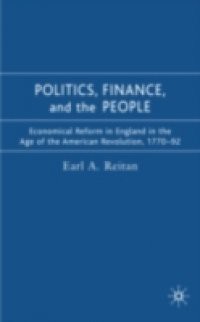In December 1779, failure in the American War unleashed a political and popular movement in Britain called 'economical reform'. It began as a political struggle between the Crown and the Opposition parties, which were supported by a powerful surge of public opinion. The initial objective of the Opposition was to reduce 'the influence of the Crown' - the honours, patronage, contracts and other benefits used the the King and his ministers to strengthen their political support in Parliament and elections. In midcourse, economical reform shifted to an emphasis on better management of the finances - improved collection of the revenue, recovering balances held by offices of tax collection and expenditure, reform of accounts and audit, abolition of sincecures and fees, and establishment of a systematic process of debt reduction. The investigations and reforms of the 1780s were the crucial first step in the long-term reform of the administrative structure.

